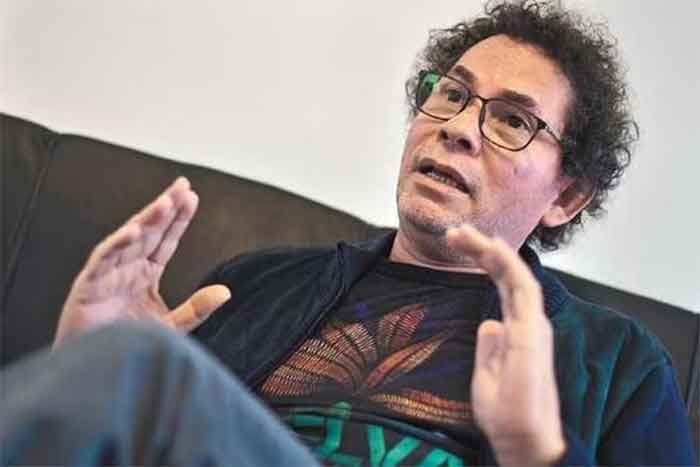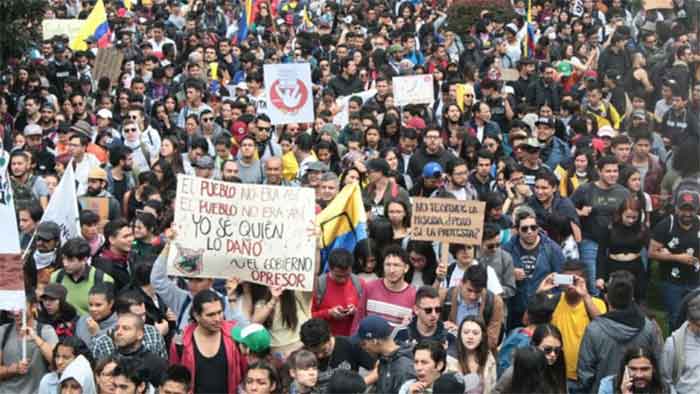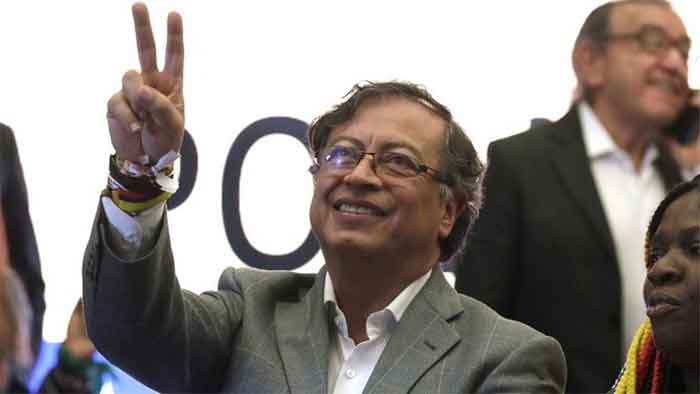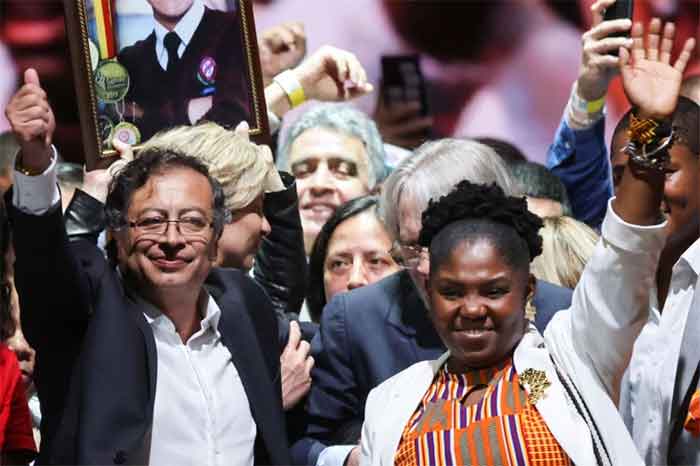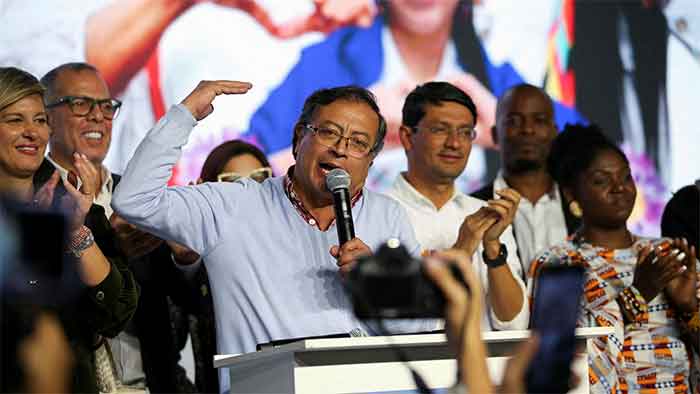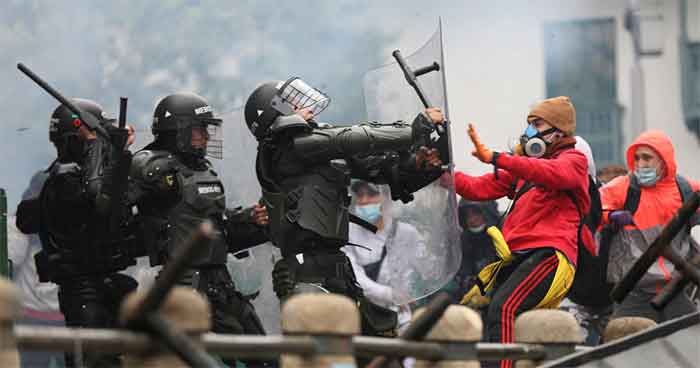
On April 28, 2021, many of Colombia’s largest unions held a national strike against tax reforms put forward by President Ivan Duque’s government to cover funds related to the COVID-19 pandemic and national debt . Demonstrators filled the streets of downtown Bogotá, Medellín, Cali, Barranquilla and Ibague, as well as smaller cities. Stores and most public services came to a virtual standstill, while May Day saw the largest crowds. Women, Afro-Colombians, indigenous people, students, farmers, urban residents, and taxi drivers joined in large numbers. The strike was supported by trade union centers including Central Union of Workers (CUT), General Confederation of Labor (CGT) and Confederation of Colombian Workers (CTC), as well as pensioners’ confederations like Colombian Federation of Educators (Fecode).
According to a statement issued by the National Unemployment Committee (CNP): “The onslaught of the Duque government with its package of economic measures against the Colombian people and the situation of violence; represented in the murder of leaders, social leaders, generalized massacres; the increase in femicides; perfidy against peace processes [initiated in 2016 to end conflict between the Colombian state and Marxist guerrillas] and refusal to advance in the search for a political solution; these [conditions] force us to redouble our efforts so that these mobilizations become a massive expression of indignation by Colombians.”
When confronted with 4 days of sustained protests and a massive national strike, Duque announced the withdrawal of the bill on May 2, 2021. However, he insisted that tax reform is vital to deal with the economic crisis and asked to urgently formulate a new bill with a consensus. “I am asking the Congress of the Republic to withdraw the bill presented by the finance ministry and urgently process a new law that results from a consensus, and thus avoid financial uncertainty.”
Regressive Tax Reform
If implemented, the tax bill, termed the Sustainable Solidarity Bill, would have comprehensively hollowed out the lives of the Colombian masses. First, it would have increased Value-Added Tax (VAT) to 19% on basic food products, fuels, agricultural inputs and public services. The imposition of VAT on nearly every item- from water to funeral services, oranges, and other fruits – would have undoubtedly pushed many Colombian families, who have been hit especially hard by the effects of the pandemic, particularly unemployment, into poverty.
Second, it aimed at taxing salaries between 2.5 million pesos (approximately $690) and 1.7 million pesos (approximately $470) from 2023. Thus, one primary effect of the tax reform bill would have been to shift income tax brackets so that higher brackets begin at far lower income levels than they did previously. This would have included the levying of income tax on a lower-income section of the population who was previously exempt from income taxes.
Third, the bill incorporated taxes on pensions with monthly payments of more than 4.8 million pesos (approximately $1,300). Fourth, it planned eliminations of certain tax exemptions for a number of companies, especially food producers, which would have resulted in a 5 to 10% rise in the production costs (and therefore the sale prices) of eggs, chicken, pork and milk. Fifth, it would have subverted an already shambolic healthcare system, increasing its commodification, and implemented Business Development Zones, meant for agro-industry, large-scale mining, and hydrocarbon exploitation. Sixth, it would have granted millions in resources to big business disguised as subsidies to cover their payrolls.
Structural Issues
Although the proposed tax reform has been scrapped and Finance Minister Alberto Carrasquilla – one of the main proponents of the reform – has resigned with Vice Ministers Juan Alberto Londoño and Juan Pablo Zárate, the demonstrations have continued because the demands go deeper than these policies. These include structural issues like poverty, the health crisis (exacerbated in recent months due to the disastrous pandemic management), hunger, repression and paramilitarization, job insecurity, the persecution of student and union leaders.
Protesters are essentially continuing the street demonstrations that began in November 2019. While the revolutionary dynamic abruptly paused due to the onset of the pandemic in March 2020, there are no signs of abatement today. Material conditions have deteriorated to such an extent that questions of existence have become synonymous with questions of resistance. The pandemic has pushed 3.5 million additional people into poverty, meaning that 43% of the population is earning less than enough to satisfy basic needs. The number of people living in extreme poverty in the capital Bogotá tripled in just a year. The health crisis also laid bare the full range of hardships suffered by the poor; poor people are at least ten times more likely to be hospitalized due to COVID-19 than the rich.
Bloodbath
Instead of listening to the demands of the people, Duque has embarked on a course of bloodbath. Announcing the deployment of troops, he threatened those “who want to intimidate society through violence, vandalism and terrorism and believe that they will defeat the institutions under this mechanism.” Moreover, he has offered 10 million pesos to those who identify protestors, signaling a ruthlessly aggressive posture. Duque has borrowed this kind of intimidatory rhetoric from ex-President Álvaro Uribe, the leader of Duque’s ruling party and his political mentor. As soon as the protest began, Uribe tweeted: “Let’s support the right of soldiers and police to use their weapons to defend their integrity and defend people and goods against the criminal actions of vandalic terrorism.”
State security forces have been attempting to terrorize neighborhoods with military violence. Low-flying US-funded Blackhawk helicopters have dropped tear gas into homes and other enclosed structures; tanks have marched through heavily populated streets (videos on Twitter showed Mobile Anti-Disturbance Squadron (ESMAD) officers celebrating after each shot fired from their tanks against the protesting masses); aircrafts have discharged gunfire at residents; security forces have cut off electricity in areas filled with protestors to capture, torture and shoot live rounds at crows trying to navigate the dark; police have brought detainees to stadiums and coliseums to mutilate them, on par with any other military dictatorship.
The result of the war against the Colombian people has been horrific. 37 people have been killed by the police till now. A total of 471 people have been reported missing since the national strike began. Further, in the April 28-May 6 period, there have been 934 arbitrary detentions, 1,728 cases of police violence, 98 cases of gunshots fired by police, 234 victims of physical violence, and 11 victims of sexual violence. Despite all this, the government remains in a callous mood. Peace commissioner Miguel Ceballos preposterously claimed that “the government has demanded non-violence and that the actions of public officials, including the security forces, are within the framework of human rights,” contrary to abundant evidence proving the exact opposite.
Sections of the Uribist ultra-right have been vociferating that a decree of “Internal Commotion” is being drafted. This can be compared to a “State of Siege,” where extraordinary powers are given to the president to restrict demonstrations, and take control of radio and television, as well as the power to issue decrees with the force of law. Undeterred, the oppressed people of continue to push for radical changes. Their demands range from the repeal of the Health Reform bill of 2010 to the imprisonment of Carrasquilla; the dissolution of the ESMAD; police reform; the resignation of public defender Carlos Camargo (who has turned a nelson’s eye toward state-sponsored butchery); the resignation of the Minister of Defense, Diego Molano; and finally, the resignation of Duque. The people seem to have braced themselves for a steadfast struggle against systemic oppression.
Yanis Iqbal is an independent researcher and freelance writer based in Aligarh, India and can be contacted at [email protected].
GET COUNTERCURRENTS DAILY NEWSLETTER STRAIGHT TO YOUR INBOX

